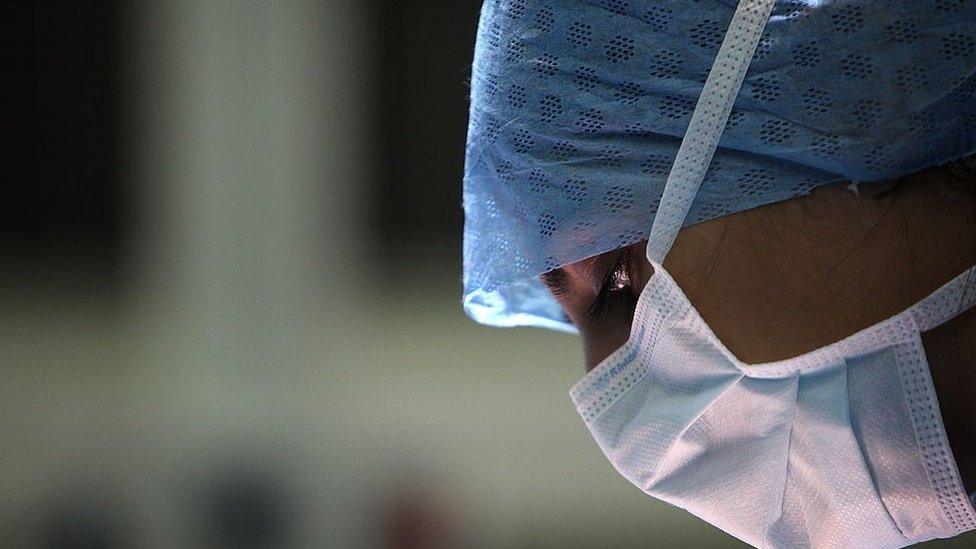'Not enough funding to hit waiting time targets'
- Published

NHS leaders said there was not enough money to hit key waiting-time targets next year
He warned waiting lists would get longer if the Budget did not deliver enough extra cash.
Now Simon Stevens, head of NHS England, has begun to spell out the consequences, as he sees things, of the chancellor's decisions.
Thursday's NHS England board meeting was peppered with phrases such as "difficult decisions" and "tough choices".
In essence, its leaders were saying there was not enough money to hit key waiting-time targets next year (2018-19) and deliver the range of care patients might expect.
Even after the Budget allocation of extra funding, NHS England says its income over and above inflation will rise at a slower rate (1.9%) next year than this year.
Pointedly, it notes that after adjusting for the age profile of the population, revenue per person rises by just 0.9% next year and actually falls in 2019-20.
Health Secretary Jeremy Hunt said the government was absolutely committed to NHS constitutional standards.
If you can't see the NHS Tracker, click or tap here, external.

All this leads up to a telling phrase in the NHS England board papers released as the meeting got under way: "Our current forecast is that - without offsetting reductions in other areas of care - NHS constitution waiting-time standards, in the round, will not be fully funded and met next year".
It is understood that this applies to both the 18-week target for non-urgent surgery and the accident and emergency benchmark of 95% of patients being treated or assessed within four hours.
'Something has to give'
Mr Stevens made clear at the meeting that he wanted to protect investment already planned for mental health, cancer and primary care (including GP services).
With all other care though, he suggested everything was up for grabs.
The message to ministers was, in effect: "If you want us to hit waiting-time targets, something else has to give."
This was the opening shot from NHS England in what seems set to be a high-charged set of negotiations with the government.
Together, they have to come up with the wording for the annually agreed NHS mandate, which is the deal over what will be delivered for the year.
The choice is between allowing NHS England to take a foot off the pedal on hitting targets or ordering it to do so but with other areas being downgraded.

Should the NHS be made to hit NHS targets or not?
The problem for the health secretary is that he has nailed his colours to the mast with the four-hour A&E target.
He has said the 95% performance level can and should be met in 2018 (it's currently about 90%).
With Mr Stevens saying that is not possible without longer waiting times elsewhere, there will no doubt be some robust discussions in the weeks ahead.
A Department of Health official said the government was supporting the NHS with extra resources "to make progress on A&E and waiting-time performance, including £335m this year to help with winter pressures".
"We expect NHS England will use that money to make sure every patient gets the treatment they require in a timely way."
The health secretary, speaking at a conference of health leaders, also gave a robust response, saying the government was committed to NHS constitutional standards.
"That's why we've now announced an increase for the NHS in the Budget. But our absolute determination is to move back towards hitting those standards, which we're not hitting all of at the moment, we recognise that."
New Year fudge
None of the key waiting-time standards in England has been met since early 2016, so some patients may feel the debate is a little academic.
But the targets are embedded under legislation in the NHS constitution and are there to give patients an assurance timely care will be delivered.
Mr Hunt has made clear in the past that the targets are essential and there is no question of them being dropped or watered down.
Yet now NHS England is saying in simple terms that there is not enough funding to hit them.
So the big question now is what happens in the negotiations between the Department of Health and NHS England in the run-up to the start of the new financial year in April.
If there's a fudge over what the NHS will deliver in 2018-19, there will be no shortage of critics ready to argue that a central pillar of the health service's relationship with patients is unravelling.
- Published22 November 2017

- Published24 November 2017